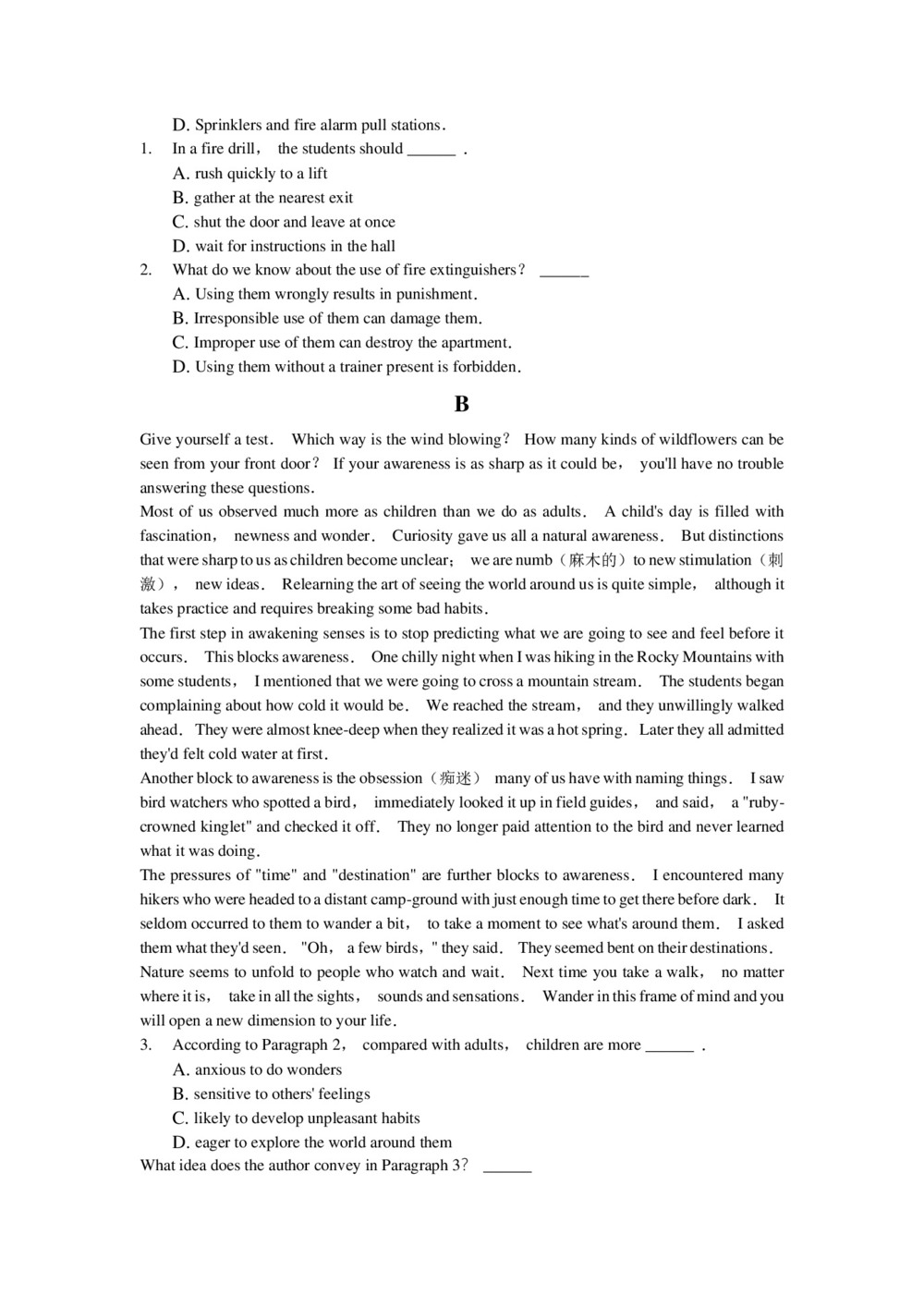
D. Sprinklers and fire alarm pull stations.
1. In a fire drill, the students should ______ .
A. rush quickly to a lift
B. gather at the nearest exit
C. shut the door and leave at once
D. wait for instructions in the hall
2. What do we know about the use of fire extinguishers? ______
A. Using them wrongly results in punishment.
B. Irresponsible use of them can damage them.
C. Improper use of them can destroy the apartment.
D. Using them without a trainer present is forbidden.
Give yourself a test. Which way is the wind blowing? How many kinds of wildflowers can be seen from your front door? If your awareness is as sharp as it could be, you'll have no trouble answering these questions.
Most of us observed much more as children than we do as adults. A child's day is filled with fascination, newness and wonder. Curiosity gave us all a natural awareness. But distinctions that were sharp to us as children become unclear; we are numb(麻木的)to new stimulation(刺激), new ideas. Relearning the art of seeing the world around us is quite simple, although it takes practice and requires breaking some bad habits.
The first step in awakening senses is to stop predicting what we are going to see and feel before it occurs. This blocks awareness. One chilly night when I was hiking in the Rocky Mountains with some students, I mentioned that we were going to cross a mountain stream. The students began complaining about how cold it would be. We reached the stream, and they unwillingly walked ahead. They were almost knee-deep when they realized it was a hot spring. Later they all admitted they'd felt cold water at first.
Another block to awareness is the obsession(痴迷) many of us have with naming things. I saw bird watchers who spotted a bird, immediately looked it up in field guides, and said, a "ruby-crowned kinglet" and checked it off. They no longer paid attention to the bird and never learned what it was doing.
The pressures of "time" and "destination" are further blocks to awareness. I encountered many hikers who were headed to a distant camp-ground with just enough time to get there before dark. It seldom occurred to them to wander a bit, to take a moment to see what's around them. I asked them what they'd seen. "Oh, a few birds," they said. They seemed bent on their destinations.
Nature seems to unfold to people who watch and wait. Next time you take a walk, no matter where it is, take in all the sights, sounds and sensations. Wander in this frame of mind and you will open a new dimension to your life.
3. According to Paragraph 2, compared with adults, children are more ______ .
A. anxious to do wonders
B. sensitive to others' feelings
C. likely to develop unpleasant habits
D. eager to explore the world around them
What idea does the author convey in Paragraph 3? ______
-
相关试卷下载
- 1河北省张家口市尚义县第一中学2019-2020学年高二上学期10月月考英语试卷 Word版含答案
- 2河北省曲阳县一中2018-2019学年高二上学期12月月考英语试卷 Word版含答案
- 3河北省阜平中学2018-2019学年高二上学期12月月考英语试卷 Word版含答案
- 4河北省曲阳县一中2018-2019学年高二上学期9月月考英语试卷 Word版含答案
- 5河北省曲阳县一中2018-2019学年高二上学期11月月考英语试卷 Word版含答案
- 6河北省曲阳县一中2018-2019学年高二上学期10月月考英语试卷 Word版含答案
- 7江西省赣州市2019-2020学年高二上学期12月月考英语试卷 Word版含答案
- 8河北省曲阳县一中2018-2019学年高二上学期10月月考英语试卷(B卷) Word版含答案
- 9河北省阜平中学2018-2019学年高二上学期12月月考英语听力